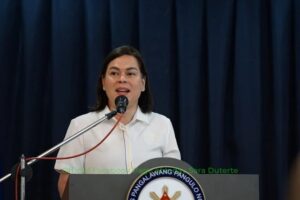
The Acerbity of Allegations: Sara Duterte and the Laptop Controversy
The political atmosphere in the Philippines has intensified following Vice President and former Education Secretary Sara Duterte’s surprising challenge to the Office of the Ombudsman, urging an investigation into the long-standing Department of Education (DepEd) laptop procurement scandal. This move, however, has been met with immediate skepticism, with critics questioning the timing and the potential political motives behind her sudden demand for accountability.
The core of the issue revolves around the procurement of teacher laptops—specifically the lower-specification Celeron-processor models—instead of the recommended i3 or i5 models, despite the substantial ₱2.4 billion budget allocated for the program. The glaring disparity between the price paid and the performance delivered has fueled long-term suspicion of massive overpricing and corruption.
The political firestorm ignited when Duterte, speaking out on Tuesday, October 14, 2025, specifically named Saldico as being allegedly involved in the anomaly. Critics immediately pointed to the glaring inconsistency: Why did the Vice President, who held numerous press conferences during her tenure as DepEd Secretary, wait until now to raise such a serious public accusation?
The Blurring Lines of the Confidential Fund
The controversy reached a fever pitch when Duterte suggested she used her controversial confidential funds—estimated to be between ₱125 million and ₱500 million for the DepEd—to investigate Saldico.
This claim has been widely denounced as an act of political opportunism. Critics argue that using secretive, unaudited funds—which have themselves been the subject of massive public inquiry—as the basis for public allegations against others is hypocritical and undermines the spirit of transparency. The common refrain is that the “confidential” nature of the funds provides an easy shield should evidence be demanded, allowing for politically motivated accusations without the necessity of tangible proof.
The original ₱2.4 billion laptop procurement case was first brought to light during the tenure of former Education Secretary Leonor Briones, who, along with other officials, faced graft and falsification charges. Duterte’s attempt to insert the name “Saldico” now, however, raises pointed questions about the narrative’s manipulation. Saldico’s alleged involvement stems from supposed “ties” to the laptop contractor, Sunwest. Skeptics have questioned this link, noting that Sunwest is primarily a construction, real estate, and energy firm, making their sudden role in a massive laptop retail contract highly suspect and lacking clear public evidence.
Selective Accountability: The Political Weapon
The most damaging critique leveled against the administration’s approach is the notion of “selective investigation.” The inquiry into the laptop anomaly, critics suggest, appears to be a politically controlled tool—employed to target political rivals or shield allies.
Commentators point to a worrying pattern: investigations often seem to encounter sudden limitations or “lack of evidence” once they approach high-ranking officials closely connected to the Executive Branch. Examples cited include the alleged expiration or disappearance of flood control documents and the abrupt closure of hearings when the spotlight turns towards powerful figures.
For many observers, Duterte’s public naming of Saldico is viewed as an act of political theatre: a carefully managed release of information designed to control the public narrative. The prevailing sentiment is that a “political umbrella” shields Congress and Malacañang, dictating which issues are allowed to flourish and which are quickly extinguished. When an investigation threatens the administration, it stalls; when the target is an ally, the matter is swiftly bypassed; but when directed at a rival or the opposition, the issue is transformed into a grand public spectacle.
The Saldico Factor and the Romualdez Connection
The complexity deepens with the political maneuverings surrounding House Speaker Martin Romualdez. While his name is often linked to major procurements to create a protective shield for others, reports suggest that Saldico was not appointed by Romualdez as procurement head but was voted upon by members of Congress, including party-lists. Furthermore, it is rumored that Saldico, not Romualdez, was the true point person for the laptop procurement discussions during bicameral meetings.
Adding to the cloud of suspicion are photographs dating back to 2019, showing Saldico and then-President Rodrigo Duterte face-to-face at the opening of a Sunwest-owned power plant in Romblon. This proximity instantly raises questions about existing partnerships and shared interests.
The analysis suggests that Sara Duterte may be attempting to cast Saldico as a convenient “fall guy” in the laptop scandal, diverting scrutiny from other potential high-level players. However, this tactic is proving difficult to maintain under the intense gaze of public scrutiny.

Beyond Laptops: A Fight for Transparency and Power
Ultimately, the issue transcends the technical specifications of a laptop. It is a fundamental conflict over power, control, and the public’s right to honest governance. When a prominent leader can wield the threat of an investigation as a political weapon or use their influence to abruptly halt inquiries, the democratic process is undermined.
The core problem is not merely in Sara Duterte’s accusations, but in a systemic structure that grants her the power to employ such calls for investigation selectively. It is a system that allows accountability to dissipate the moment a topic becomes politically sensitive.
The public demands more than political rhetoric. They demand real document access, open and comprehensive hearings, and genuine accountability from those who hold the reins of power.
Citizens are urged to remain vigilant: to question, to demand documentation, and to refuse to accept “lack of sufficient evidence” as a simple conclusion. For Vice President Duterte, the message from the public is clear: if an investigation is truly warranted, it must be supported by concrete evidence, not just political grandstanding. The nation demands substantive action over political spectacle. The Philippines is not a stage for political drama; it is a republic demanding justice for its citizens.





